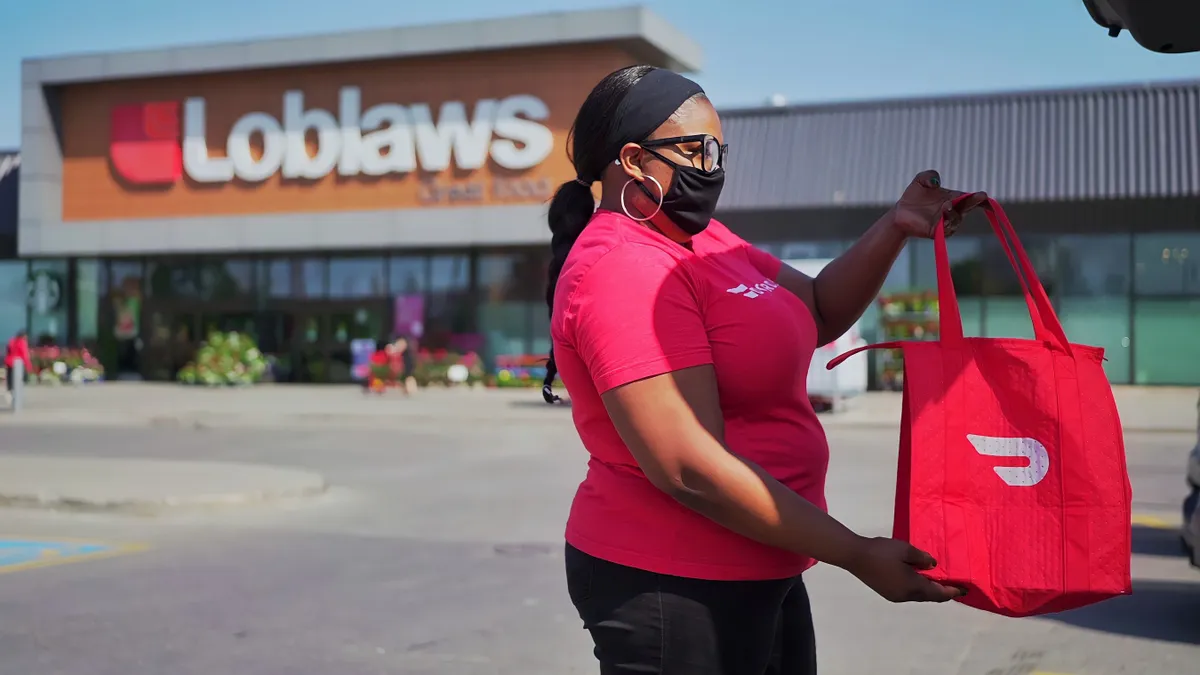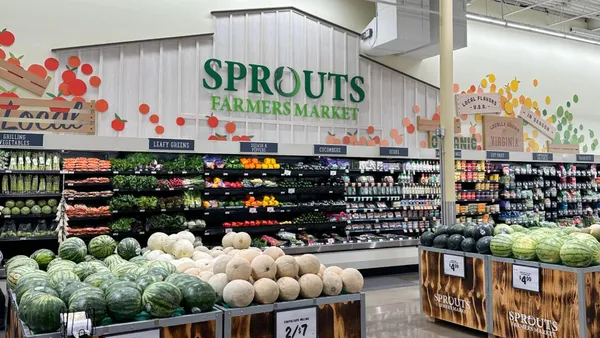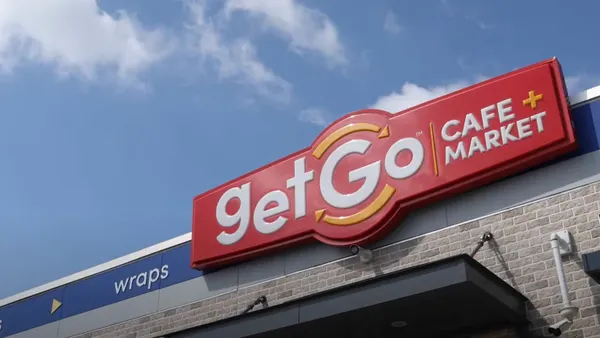Dive Brief:
- DoorDash announced Wednesday that it will soon launch a dark store-powered rapid delivery service in partnership with Canadian grocer Loblaw.
- PC Express Rapid Delivery will provide service in 30 minutes or less from an assortment of 5,000 to 8,000 items supplied by Loblaw and fulfilled through DoorDash-run dark stores, Fuad Hannon, DoorDash's vice president of new verticals, said in an interview. The rapid delivery service is launching in major Canadian cities in August, including Vancouver, the greater Toronto area, Calgary and Kitchener.
- This partnership marks DoorDash’s first foray into using dark stores to power rapid delivery for a retail partner as it looks to diversify its service offerings and take on e-commerce leader Instacart.
Dive Insight:
The new PC Express Rapid Delivery service, which builds on Loblaw’s existing PC Express service, marks a key evolution for DoorDash in the turbulent rapid delivery space.
After launching its own convenience delivery service, then shifting into 15-minute delivery followed by a store-based “express” delivery for Albertsons, DoorDash is now using its dark stores to power speedy delivery for a major retailer. The move underscores the company’s growing clout as a service provider for grocers as well as the mounting confidence it has in speedy delivery service, despite the sector’s many challenges.
PC Express Rapid Delivery allows customers to order convenience items with a quick turnaround time either through the DoorDash or Loblaw platforms. “We know that customers shop across multiple platforms,” Hannon said, calling the partnership expansion a “multi-platform play.”
The orders will come from dark stores run by DoorDash and supplied by Loblaw and delivered by DoorDash gig workers. Hannon said the fulfillment centers are a “few thousand square feet” and that the number of facilities for the metropolitan areas will vary depending on how many are needed to serve customers quickly.
While the dark stores aren’t automated, Hannon said the picking systems and inventory stocking will help it “nail a 30-minute promise.” Hannon said the dark stores for Loblaw are “very similar” to DoorDash’s DashMart convenience service, which launched in the summer of 2020. In an interview last fall, Hannon said DoorDash planned to use what it has learned from operating DashMart online convenience stores to help power similar services for retailers.
“DoorDash has been operating in Canada for many years. And so one of the hardest things historically has been the logistics of the last mile network, and we're fortunate that we have a restaurant business that is a scaling business that powers 30-minute delivery,” Hannon said.
The new service will allow DoorDash and Loblaw to tap into the different use cases around rapid delivery, where customers often need missing ingredients or snacks, Hannon said: “We know customers shop in different ways depending on the occasion, and this is us trying to reach customers where they are.”
The Loblaw partnership comes a few months after DoorDash announced an “express” grocery delivery service with Albertsons, with fulfillment happening at the grocery chain’s stores. In December, DoorDash launched a 15-minute delivery service in New York City, joining a crowded field of competitors.
In addition to the rapid delivery service coming later this summer, DoorDash will also list a “majority” of Loblaw’s 2,500 stores on its marketplace beginning in July, covering 85% of Canada’s population, according to a DoorDash spokesperson.
DoorDash has been providing white-label delivery service for Loblaw through its DoorDash Drive fulfillment offering ”for a number of years,” Hannon said. Drive, which launched in 2016, has allowed DoorDash to extend its service beyond the DoorDash platform and give retailers access to an on-demand delivery fleet while keeping orders on their websites and apps.
DoorDash’s multi-part partnership with Loblaw highlights the various services the e-commerce company is trying to offer grocers as it expands beyond its legacy restaurant delivery service. As online grocery sales have steadily come down from their early pandemic peak, DoorDash and close rival Instacart are trying to adjust and power more white-label and rapid delivery services that play to their strengths in technology, logistics and workforce size.
With 25 million monthly active users, of which 10 million are DashPass subscribers, DoorDash is leveraging its customer base of people who typically don’t order directly from a merchant’s app as an advantage for grocers seeking “incremental” shoppers and use cases, Hannon said.
DoorDash is moving assertively into grocery fulfillment services as Instacart, which has been a key online provider for grocers, adjusts its approach. In March, Instacart announced 15-minute delivery powered by “nano-fulfillment centers” as part of a suite of technologies and services for retailers called Instacart Platform. A month later, the company revealed it has started to offer rapid delivery service with Publix that’s powered by a few non-fulfillment centers.












